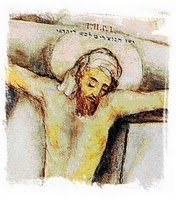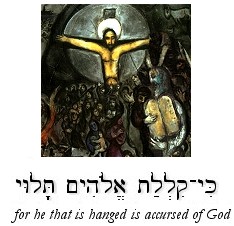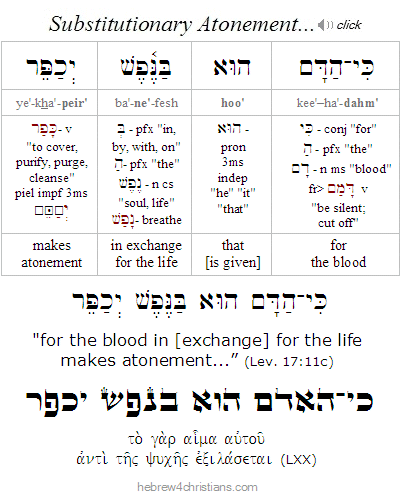|
|
|||||||||||||||||||||
 |
|||||||||||||||||||||
 |
|||||||||||||||||||||
|
|
||||||||||||||||||||||||||||
|
OUR FAITH AFFIRMS THAT Yeshua's death was "for you," that he died "in your place," that when he died, you died with him, and furthermore that when he rose from the dead, you also rose with him.... "For you have died, and your life is hidden with Christ in God" (Col. 3:3). In other words, He has identified you with who he is. But how are we to understand all this? What is the nature of this "life-for-life" (and death-for-death) exchange? How are we "identified" with Yeshua and His death and resurrection?
To overcome the alienation caused by sin and guilt, the worshipper would bring a defect-free animal (korban) to the entrance of the Mishkan and place both his hands on the animal's head, leaning on it to identify it with himself (Lev. 4:29). This act of "semikhah" (סְמִיכָה) did two things: First it spiritually transferred the person's sin to the sacrificial animal, and secondly it transferred the innocence of the animal back to the person. It was an "exchange" or "substitute," one life for another. Then, the offerer himself would slay the animal and confess that his sin caused the innocent victim to be slain in his place (Menachot 110a). In this way atonement with God was made possible...
As Oswald Chambers once wrote, "Get alone with Jesus and either tell Him that you do not want sin to die out in you - or else tell Him that at all costs you want to be identified with His death."
1. A woman is married to a man; When Paul then explained how this case applies to our relationship with the law, however, he seems to have switched the terms of the analogy. He says: 1. You were under the law; But just who died - you or the law? The analogy would seem to identify the believer with the woman and the law with her husband, but that would imply that the law died, something which Paul would never suggest (the law of God is not the cause of sin but rather the "messenger" of sin's presence; you cannot blame an x-ray machine for the detection of a tumor, after all). The main point, however, is that the death of one of the two parties in a contract absolves the terms of that contract and ends the obligation. You "died to the law" through the death of Yeshua for the sake of being in a new covenant with God - "so that we would belong to another, to him who has been raised from the dead, in order that we may bear fruit for God" (Rom. 7:4). Note further, however, that we are delivered from the curse of the law, but not the law itself! The Torah is holy, just, and good: written on our hearts by the power of the Holy Spirit, in accordance with the promise of the New Covenant of God (Jer. 31:33).
This is the "bikkurim" connection with this week's Torah portion. The whole point of the great Passover and the Exodus from Egypt was to bring us into our inheritance and make us fruitful before the LORD. The fruit of the Spirit (פְּרִי הָרוּחַ) is the result of a new union or relationship with God, a "new covenant" given "apart from the law" (Rom. 3:21). We now serve the LORD in a new way - by the power of the Holy Spirit, not by following legal ordinances or other rules (2 Cor. 3:6). "If you are led by the Spirit, you are not under the law" (Gal. 5:18), that is, you are no longer in a "legal" relationship with God based on the terms of the Sinai covenant and its curses.... As Paul further wrote: "Sin will have no dominion over you, since you are not under law but under grace" (Rom. 6:14). The grace and love of God is what enables us to fulfill the inner intent of the law by means of the invincible power of Yeshua's resurrection life.
|
|
Hebrew for Christians |
|||||
|
|||||




